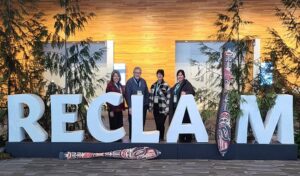Anishinabek Nation Health Transformation Team prepares for engagement sessions with Anishinabek Nation First Nations leadership

By Jesse Johnson
ANISHINABEK NATION TERRITORY – The Anishinabek Nation’s Health Transformation Team has expanded their knowledge-base after attending the Gathering Wisdom for a Shared Journey forum hosted by the B.C. First Nations Health Authority in February. The Team witnessed the governance structure in action as nearly 200 Chiefs voted on the resolution to ratify a historic document: a 10-year Strategy on the Social Determinants of Health.
“We have gained valuable information from this experience, made some new connections, and built stronger working relationships with the FNHA Leadership and ISC (Indigenous Services Canada) staff,” says Loretta Nootchtai, Anishinabek Nation Health Transformation Project Manager.
The Health Transformation Team is currently meeting with interested Chiefs and Councils to introduce Health Transformation.
“The team has accepted, and will continue to accept, invites from all interested First Nations and health organizations who provide programs and/or services to the 39 First Nations within Anishinabek Nation,” says Nootchtai.
Engagements have also started with First Nation community health partners, such as Dilico Anishinabek Family Care in Thunder Bay. Ont., and Manitoulin Health Centre in Little Current, Ont., to begin discussions on how Health Transformation may affect or interrelate with Ontario Health Teams.
The Health Transformation Team welcomed a new member, Gerrilynn Manitowabi, as the Health Transformation Lead. Manitowabi brings a wealth of experience from her time working with the Canadian Institutes of Health Research, First Nations Health Authority in B.C., and Community Health Centre in Wiikwemkoong Unceded Territory.
“I look forward to connecting with the Chiefs and leaders so that we can continue pushing Health Transformation forward. There is a lot of work that needs to be done, and we have already come a long way, but there are so many opportunities in front of us,” says Manitowabi. “We have received a lot of positive feedback from the communities we have visited so far, and I am confident that will continue.”
A Grand Council Resolution was drafted and presented at the Anishinabek Nation Southeast Regional Chiefs Meeting in Alderville First Nation on May 12 in order to seek support with submitting a business case to ISC for Health Transformation funding. With this funding, the Team will be able to pursue thorough and in-depth engagements and assessments with communities and their members to work towards the implementation stage of creating a new health system design that suits our populations.
The Team has plans to recruit Regional Engagement Coordinators this fiscal year. Once the first phase of engagements with Chiefs and Councils are complete, the team will begin meeting with health department staff and community members.
The most recent Working Group meeting was held on April 12 and 13 in Sault Ste. Marie, Ont., where Dr. Jennifer Walker, Associate Professor at McMaster University, presented an overview of the baseline health indicators and discussed her work at IC/ES and McMaster University with Indigenous health data and databases.
To date, the Health Transformation Team has met and delivered their presentation to 15 of the 39 Chiefs and Councils. So far, the feedback has been positive.
“In order to continue with our process, we cannot express the importance of each community’s Chief and Council participating in our introductory engagement sessions,” says Manitowabi.
The Health Transformation Lead will also be presenting at the upcoming Mental Health Summit organized by the Anishinabek Nation’s Health Secretariat on May 24 and 25 in Sault Ste. Marie at the Quattro Hotel and Conference Centre.
For more information, go to www.health-transformation.ca.


